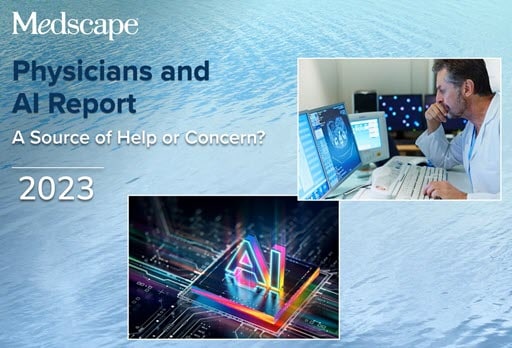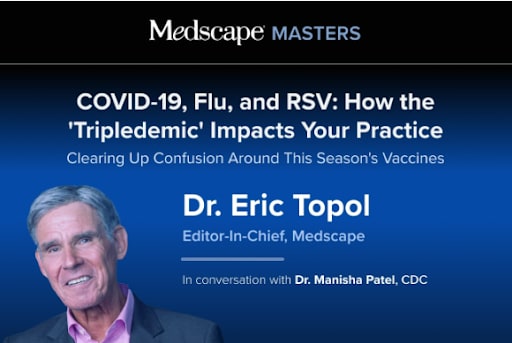Event Transcript
Click here to access the full transcript (pdf)
Summary and Key Highlights
By Kara Grant
The third installment of the Medscape Masters series tackled the question: Is your practice ready for the future of artificial intelligence? To discuss the issue, Eric Topol, MD, Medscape's editor-in-chief, was joined by Raj Manrai, PhD, a deputy editor at NEJM AI and assistant professor of biomedical informatics at Harvard Medical School; and Ted James, MD, medical director and chief of breast surgical oncology at Beth Israel Deaconess Medical Center and an associate professor at Harvard Medical School. The conversation was moderated by WebMD Chief Medical Officer John Whyte, MD.
Ahead of the event, Medscape published its Medscape Physicians and AI Report 2023: A Source of Help or Concern?, which addressed the following concerns among healthcare professionals.
What is AI's current role in physicians' practices?
AI programs have been assisting with everyday administrative tasks like billing, scheduling, and data entry. "We've already seen it taking away hours of work from many physicians' practices," says Topol.
Digital scribes have even been shown to be acceptable, accurate, and relatively easy to use. This is an example of how AI can "alleviate a lot of burdens, decrease burnout, and...make things better for both physicians and patients," James says.
One of the most promising examples right now, James says, is health organizations that are using AI to monitor patients who have left the hospital, and the ability to recognize high-risk patients in particular. "They'll have a chatbot check-in on a patient on a daily basis...and track their progress and alert clinicians if there are any deviations in their path to recovery," James says.
Why some HCPs are apprehensive about AI:
Some of the major concerns that healthcare professionals have about AI are the risk for errors, degradation of the program over time, or, in some cases, "hallucinations," wherein the AI will just make up answers.
There are also privacy concerns, including how AI works against — or in tandem with — HIPAA rules. Manrai says that data confidentiality with AI is a rapidly evolving and complicated landscape, but health systems are still moving forward with secure models. On privacy, many questions remain.
The key to all of this, the panelists say, is always professional oversight of the technology, especially when it comes to the future of AI in diagnostics.
Whether AI may increase — or decrease — the risk for medical malpractice that leads to lawsuits. There's even the possibility that an AI model could make the correct diagnosis but a physician erroneously overrules it. Manrai says we don't yet have clarity on this.
Topol says that medical diagnostic errors already occur at alarmingly high rates, with devastating consequences. "We have a tool here that can help. Ultimately, the physician is always going to be responsible."
Can AI potentially increase burnout? Possibly, says James. It depends on how it is implemented.
What can we expect for the future?
According to Manrai, we are seeing early glimpses of AI's potential to pend orders, but the programs aren't yet ready for use. Both Manrai and James agree that the technology to do so is rapidly getting better and we're getting closer to being able to implement it.
Many health systems, Manrai says, are piloting AI programs that step in as EMR assistants, generating empathetic responses in online correspondences and converting complicated medical jargon into legible summaries for inquiring patients.
Topol notes that AI programs may even be used to coach physicians to make them more empathetic and rebuild relationships with patients that have been splintered over time because of how busy doctors can get.
AI can also play a crucial role not only in early diagnosis but also in identifying patients who are at high risk for cancer and other diseases. James's breast center plans to pilot a program that will scan patient records to identify a family history of breast cancer and other factors that put patients in the high-risk category.
James succinctly captures the future of AI: "It's not that AI is going to replace physicians, but that physicians who use AI will replace physicians who don't use AI."
Medscape Physicians and AI Report 2023

Medscape recently surveyed US physicians about how they saw artificial intelligence's future evolving in medical offices and hospitals. You may be surprised by how they responded. READ REPORT >>
Our Editors Also Recommend:
Also from Medscape Masters:

Medscape © 2023
Cite this: AI Is Here. Is Your Practice Ready? - Medscape - Nov 10, 2023.










Comments